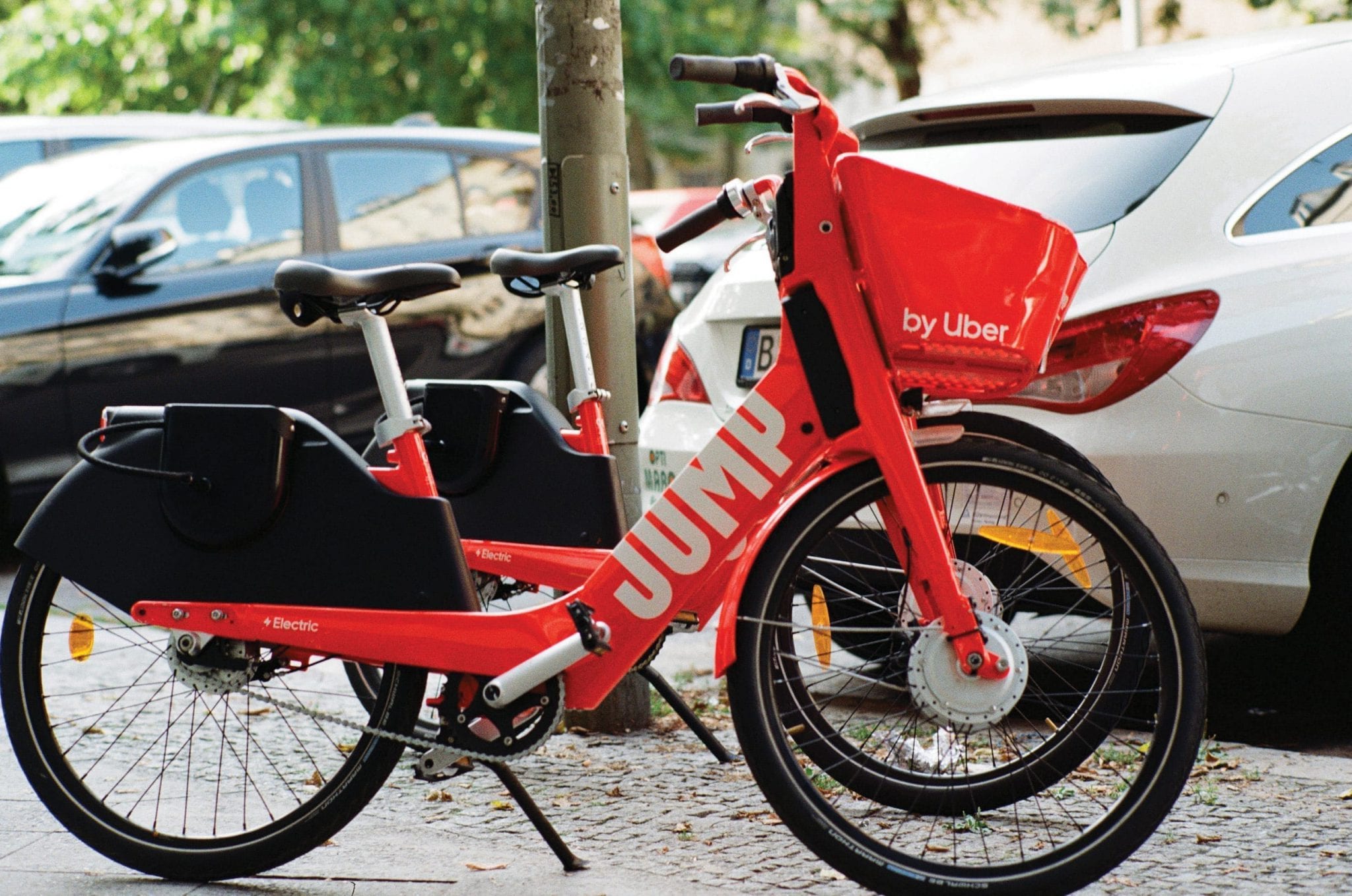Micro-Mobility: Challenges and Opportunities for Cities & Regions
The rise of shared dockless (e-)bikes and electric scooters alongside ride-sourcing and other demand-responsive mobility services are changing urban mobility landscapes. Micro-mobility is now a commonly used term covering shared-use fleets of small, fully or partially human-powered vehicles such as bikes, e-bikes and e-scooters.
Bike-share
Where does the success of sharing bikes, or sharing in general, come from? The demand for shared mobility has grown over the past decade, as a result of new societal trends, business models and technology developments, and bicycles have become an increasingly popular means for daily transport rather than just being used for recreational purposes.
Since the launch of Europe’s first large public bike-share scheme, Vélib’ in Paris in 2007, an increasing number of cities and towns have procured docked bike-share services. Bike-sharing schemes are often implemented as part of a city’s sustainable urban mobility strategy that addresses the adverse impacts of transport: air pollution, congestion, traffic crashes, noise. An essential change on the way to boosting the quality of life in cities is an improved modal shift in favor of walking and cycling.
Building a local cycling culture and improving cycling conditions (infrastructure, parking, tax incentives) is the way forward to promote active transport modes for short distances and first and last mile trips. Bike-sharing schemes have the potential to help local governments deliver clean, healthy and efficient urban mobility.

Conventional bike-share (docked or dockless) has fast evolved into the 5th generation of data-driven bike-share. To date, a variety of schemes are available across European cities, featuring traditional or electric-powered bicycles, cargo bicycles, light docking infrastructure, photovoltaic energy recharge stations, smart locks, geo-fence solutions, and GPS tracking.
Meanwhile, new private mobility providers saw opportunities to sell sustainability and eco-consciousness through new, door-to-door services, tailored to the permanently connected mobility consumer. Conventionally procured (and usually but not exclusively docked) bikeshare schemes now operate side by side to commercially operated dockless bikeshare services, and more recently free-floating electric scooters and (electric) bicycles.
MANCHESTER: First large dockless bike-sharing
The first large dockless bike-share scheme launched in a major European city was in Manchester. When testing dockless bicycles in 2017, Manchester did not have any existing bike-sharing scheme. Transport for Greater Manchester (TfGM), the public transport authority, signed a Memorandum of Understanding (MoU) with a single dockless bicycle operator launching in June 2017, deploying a fleet of 1,000 bicycles for a trial period of one year. It was a trial under MoU pretences and not a traditional scheme that involves a public tender and clear long-term commitments. The operator decided to cease operations after the trial in early September 2018, allegedly due to theft and vandalism of bikes.
TfGM issued an evaluation report, looking at the data on key numbers, evaluating movements and analyzing various issues that came up. Findings included that an MoU does not necessarily provide all the tools required to manage the scheme effectively. For dockless schemes to be sustainable in the long-term, you need a larger operational team to reshuffle bicycles and scale-up. This was difficult because it was a local operation and there was a limited supply of bikes and staff. The lack of a plan about how to educate and raise awareness amongst users contributed to vandalism and misuses.
This new business model was based on introducing much larger bicycle fleets at a much quicker pace than conventional bikeshare could do, enabled by free-floating technology not requiring expensive docking stations. Some first-generation commercial fleets were literally deployed overnight, surely lacking integration with the city’s sustainable transport strategy. On the other hand, this type of dockless bikeshare system has been brought to city streets at zero or small cost for the local authority, making it attractive for cities and towns which cannot afford the higher operational costs of conventional and publicly procured bikeshare schemes.
Electric scooters
A new category of portable, fun and compact shared transport devices was launched in 2018, the so-called scooters or kick-scooters, electrically- powered and with a speed up to 30- 40km/h. Similar to shared bikes, shared e-scooters are made available through an app-based service, which locates the device through GPS and unlocks it with the help of a smartphone.
There’s a growing and increasingly competitive market for scooters, which have popped up massively in the streets of cities such as Paris, Madrid, Lisbon, and Brussels, but also in central and Eastern Europe, in cities like Bucharest. Sharing schemes have been launched by large providers coming from the United States, but the number of European companies is growing every day.
E-scooters cater for the rising demand for quick, individual mobility solutions and door-to-door trips that can bypass congested traffic with little effort. In an ideal scenario they complement and fill the gap left by public transport and serve as first and last mile connectors, without replacing active and therefore healthier modes of travel such as walking or cycling.

As with any new vehicle, safety concerns are important, such as maximum speed, visibility, stability, the size of the wheels and braking. On the infrastructure side, there is the issue of potholes, which are already a danger to cyclists and could be even more of a threat to fast e-scooters. UK statistics show that over the last 10 years, 400 cyclists have been seriously injured or killed due to poorly maintained roads.
The placement and parking of e-scoot- ers raises concerns especially when sidewalks are not wide enough. These should remain the space where the pedestrian has priority over all other modes. Some companies require their customers to take a photo before completing the ride to assess how the e-scooter was parked. Geofencing the e-scooters can solve issues regarding cluttering in certain areas. What this problem reveals, however, is the lack of dedicated parking space for bikes and e-scooters in the urban environment. If you consider that one car parking spot could already accommodate several e-scooters and bikes, we should clearly be reallocating urban space away from the private car to micro-mobility modes of moving around. Lisbon, for example, addressed the problem of chaotic scooter parking by reallocating a number of car parking spaces to e-scooters.
PARIS: From reacting to acting towards bikeshare and e-scooter operators
Almost 15,000 e-scooters are available today on the streets of Paris. To regulate this fleet, the municipality has put in place a fee for companies, which increases according to the number of scooters deployed.
The Paris City Council adopted a Code of Conduct in 2018 which was signed by all nine dockless bikeshare providers. The Code of Conduct included to comply with the regulatory framework of traffic laws, accessibility plan and quality of vehicles as well as commitment to communication with the city of Paris such as to participate in regular meetings that consider adaptations of service to meet the local context needs. The city has confirmed in the Code its ambition to increase bicycle parking spaces to more than 40,000 by 2020. E-scooter companies were invited to sign the code of conduct until the end of May 2019.
In April 2019, the city council of Paris adopted measures to regulate shared e-scooters and to protect pedestrians. Since 1 July 2019, e-scooters are only allowed to park on car or motor parking places. Parking on the sidewalk or bike-parks is forbidden. Operators are asked to limit the speed to 20km/h and to 8km/h in pedestrian areas and “zones de rencontre” (“meeting areas”), and to stop any further deployment in Paris.
The city and the police will be working together to analyze the number of accidents where e-scooters are involved and the city advises e-scooter-users to wear a helmet.
Paris also announced that a tender will be launched from autumn 2019 to select up to three operators that will be allowed to operate in Paris from 2020. The number of e-scooters will be limited, and social and environmental aspects will be considered in the selection criteria. During June 2019, five or six of the city’s 13 fleet operators already pulled out of Paris.
Paris region supports the integration of the different services and Ile-de-France Mobilités met all free-floating service providers and set up a charter aiming to include free-floating bikes and (e-)scooters within their mobility offering.
Local Regulation
Cities across the European Union are looking hard at all these questions and have pursued different approaches towards e-scooters or docked and dockless bikeshare operations. These policy options vary to some extent from country to country, depending on the overarching regulatory and legislative framework and the degree to which the city administration itself has any regulatory autonomy over such issues. The Innovation Brief Regulating dockless bike-sharing schemes, developed by the CIVITAS 2020 PROSPERITY project, identified six types of policy options for cities, including the hands-off approach, regulative ground rules, operational permits, contracts for concessions, pilots, and banning/not allowing operations.
However, the bikeshare policy options mentioned above are not as clear cut in practice, and many cities find themselves ticking more options when dealing with micro-mobility regulations. Given the new and fast-evolving nature of the services to be regulated, local authorities are unavoidably going through a stage of trial and error, where they experience that some regulatory approaches or specific rules may work better than others. This is inherent to the nature of these innovations, where cities may feel they are constantly trying to catch up with reality and fast-paced disruptions. Regulations should become more flexible to be able to accommodate these sometimes still unknown changes in a faster way and enable more pro-active interventions. Regulatory sandboxing to trial the impact of new solutions as well as of regulatory approaches can only be recommended.
GECKO: Horizon 2020 in Action
EU-funded research supports authorities to develop new regulatory frameworks. The GECKO project, funded under Horizon 2020, assesses which actions will be required up to 2040 for policy-makers to devise regulatory approaches for disruptive innovations and new regulatory frameworks streamlining uptake.
GECKO collects and exchanges insights about the challenges and opportunities for new and emerging mobility solutions with EU and global stakeholders. Consultation is organized specifically on automation end emerging technology; shared mobility, public transport and Mobility as a Service (Maas); and digitalization and data-drive models. GECKO will issue recommendations to policy-makers to enable adaptive and anticipatory regulatory schemes and governance with novel policies that contribute to sustainable mobility goals.
GECKO welcomes stakeholders working on new mobility services, Mobility as a Service (Maas) as well as technical providers of shared mobility, policy-makers and researchers.
Visit GECKO project to learn more.
A city needs the ability to manage, design, and understand what is happening in the public realm. Traffic and mobility data are one of the crucial sets of information needed for that purpose. Digital mobility services such as dockless bikes and e-scooters can provide the city with unique information to which they never had access. It can explain and justify modal share, thus helping to make the case for investing in more dedicated infrastructure, such as bike lanes.
Taking stock of and documenting the most recent developments and governance approaches for commercially operated shared micro-mobility schemes, Polis is working on the regulation schemes of shared micro-mobility services in cities with the aim to support local governments and transport authorities in developing governance frameworks and regulations which are suitable to their needs and align these new mobility services with their sustainable, multimodal and integrated sustainable transport policy goals. Stay tuned!
Learn more about POLIS here.